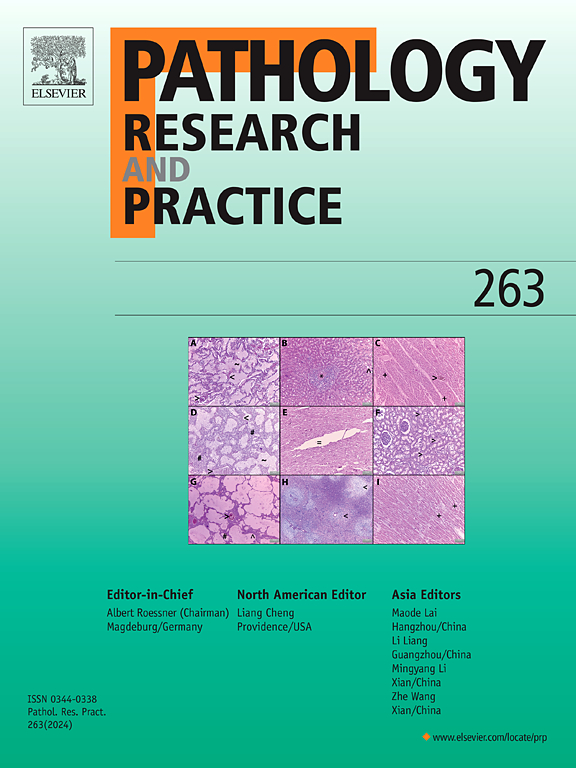IFN-γ在癌症中的矛盾作用:平衡免疫激活和免疫逃避
IF 2.9
4区 医学
Q2 PATHOLOGY
引用次数: 0
摘要
干扰素-γ (IFN-γ)被认为具有抑制细胞生长、促进程序性细胞死亡和刺激针对肿瘤进展的免疫反应的能力。然而,癌细胞通过产生抑制抗肿瘤免疫反应的因子来利用IFN-γ。探索IFN-γ的多种功能可以为癌症研究和免疫治疗的发展提供新的视角。IFN-γ在免疫系统中发挥着多方面的作用,包括通过触发肿瘤细胞上PD-L1等检查点分子的表达,帮助提高癌症免疫治疗的有效性,特别是免疫检查点抑制剂治疗。相反,它也可以通过促进肿瘤抵抗而降低免疫治疗的有效性。此外,肿瘤微环境内存在的IFN-γ水平似乎决定了IFN-γ是促肿瘤反应还是抗肿瘤反应。因此,加强对IFN-γ多方面作用的理解可以彻底改变癌症生物学的方法和针对免疫系统的干预策略。本文综述了IFN-γ在肿瘤和免疫学中的调节作用。本文章由计算机程序翻译,如有差异,请以英文原文为准。
The paradoxical role of IFN-γ in cancer: Balancing immune activation and immune evasion
Interferon-γ (IFN-γ) is recognized for its ability to inhibit cell growth, promote programmed cell death, and stimulate immune responses against tumor progression. However, cancerous cells exploit IFN-γ by producing factors that suppress anti-tumor immune responses. Exploring the diverse functions of IFN-γ can offer fresh perspectives for cancer research and the development of immune-based therapies. IFN-γ plays a multifaceted role in the immune system, which includes aiding in boosting the effectiveness of cancer immunotherapy, particularly immune checkpoint inhibitor therapy, by triggering the expression of checkpoint molecules like PD-L1 on tumor cells. Conversely, it can also diminish the effectiveness of immunotherapy by contributing to tumor resistance. Moreover, the level of IFN-γ present inside the microenvironment of the tumor appears to dictate whether IFN-γ acts as a pro-tumor or anti-tumor response. Therefore, enhanced comprehension of IFN-γ's multifaceted actions can revolutionize approaches to cancer biology and intervention strategies targeting the immune system. This review provides an overview of the regulatory roles of IFN-γ in cancer and immunology.
求助全文
通过发布文献求助,成功后即可免费获取论文全文。
去求助
来源期刊
CiteScore
5.00
自引率
3.60%
发文量
405
审稿时长
24 days
期刊介绍:
Pathology, Research and Practice provides accessible coverage of the most recent developments across the entire field of pathology: Reviews focus on recent progress in pathology, while Comments look at interesting current problems and at hypotheses for future developments in pathology. Original Papers present novel findings on all aspects of general, anatomic and molecular pathology. Rapid Communications inform readers on preliminary findings that may be relevant for further studies and need to be communicated quickly. Teaching Cases look at new aspects or special diagnostic problems of diseases and at case reports relevant for the pathologist''s practice.

 求助内容:
求助内容: 应助结果提醒方式:
应助结果提醒方式:


